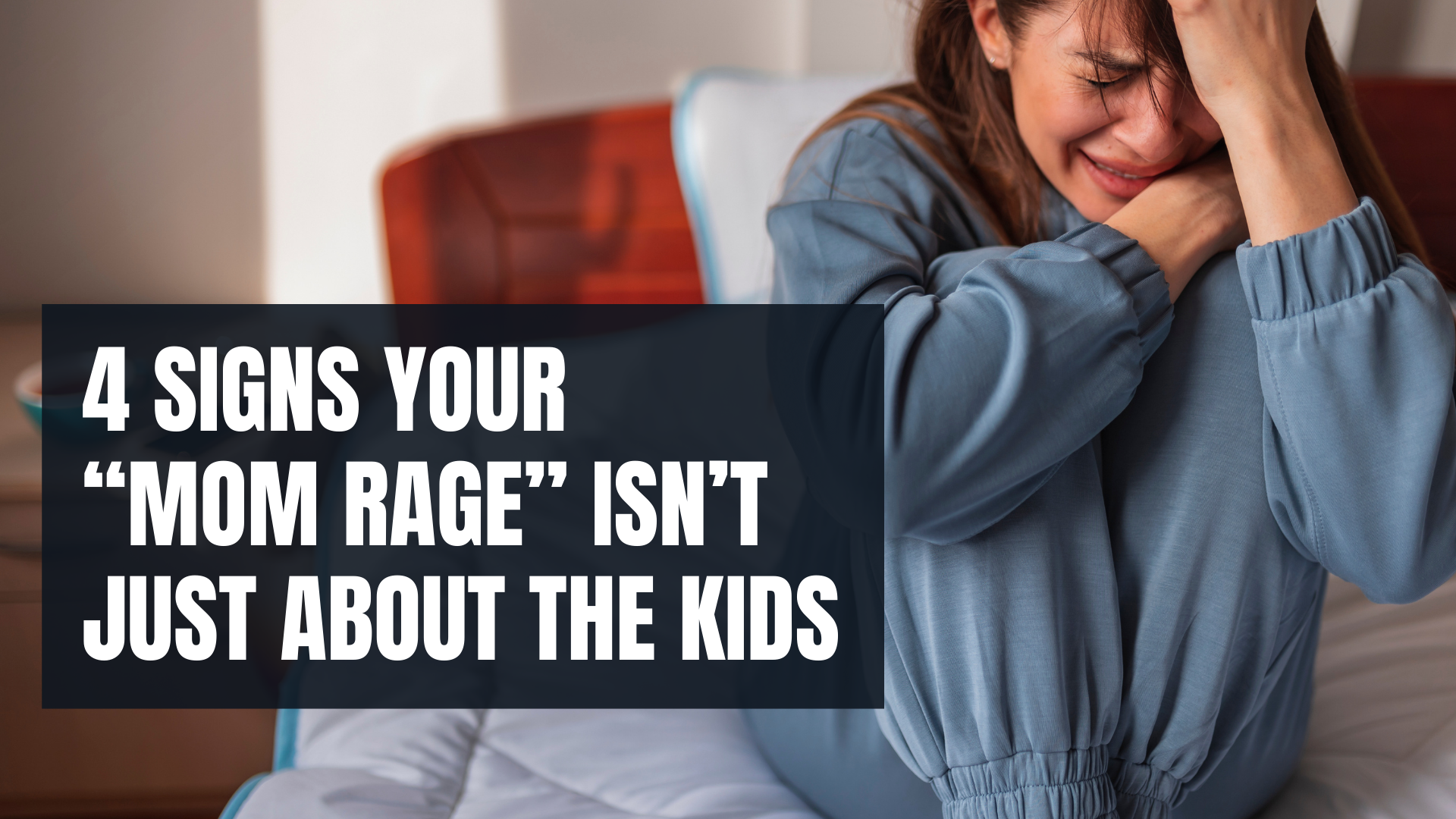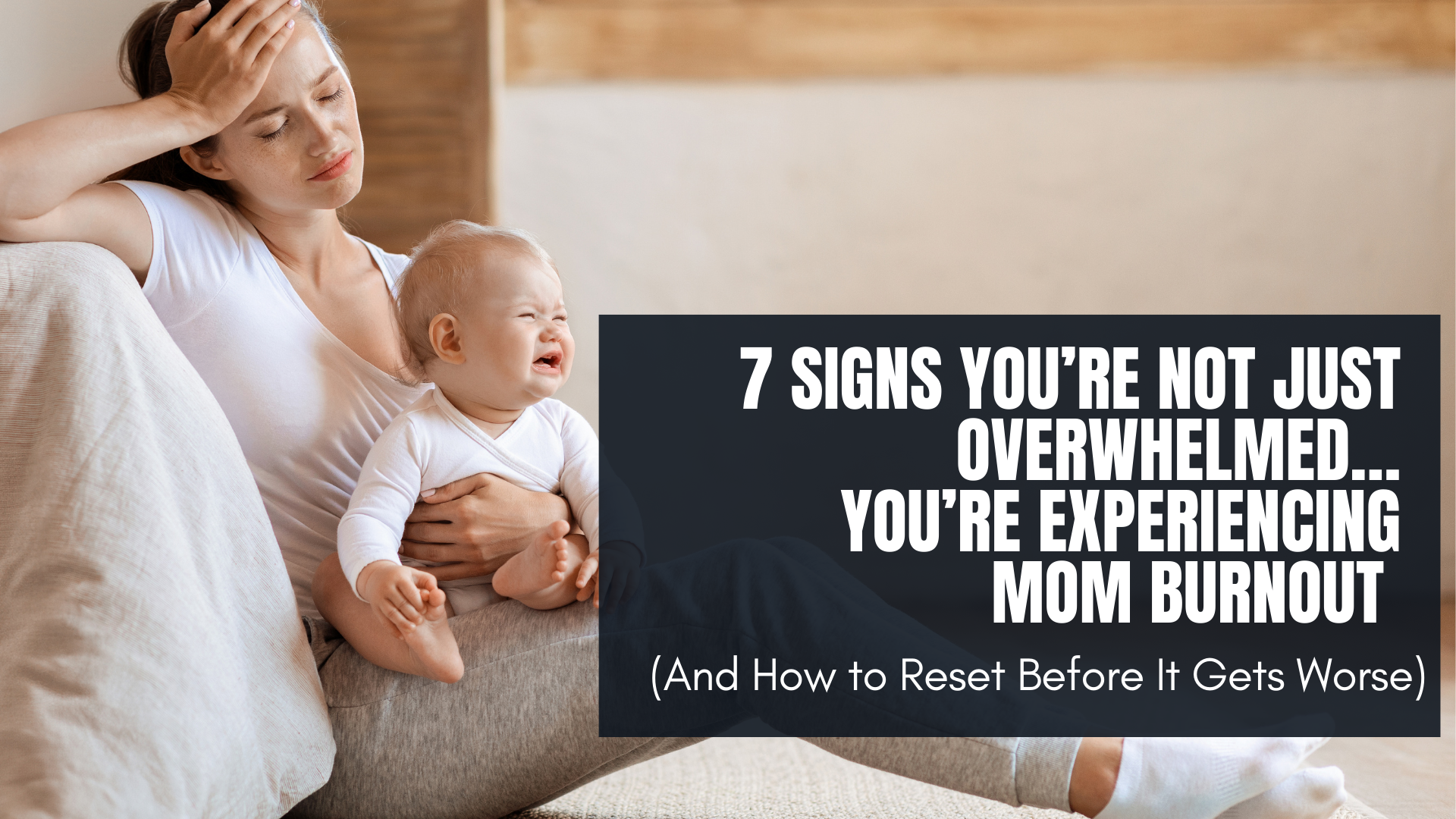5 Truths About Mom Guilt That No One Tells You
Hey mama,
Let me guess - you’ve felt guilty about something mom-related in the last 24 hours. Maybe it was letting your kids have screen time so you could make dinner in peace. Maybe it was working late and missing bedtime. Maybe it was feeling irritated with your children when they were just being… children.
If I’m right, welcome to the club that literally no one wants to join but somehow we all end up in: the Mom Guilt Club.
As a behavior analyst and mom of four (including twins!), I’ve spent years studying human behavior and emotions. And here’s what I’ve discovered: almost everything we’ve been told about mom guilt is wrong.
The advice to “just let it go” or “stop being so hard on yourself”? It doesn’t work because it misses the deeper truths about what mom guilt actually is and why it exists.
Today, I’m sharing the five truths about mom guilt that no one talks about - the ones that will help you understand this complex emotion instead of just fighting against it.
Truth #1: Mom Guilt Isn’t Actually About Being a Bad Mother
Here’s the first truth that might surprise you: mom guilt isn’t evidence that you’re doing something wrong. It’s evidence that you care deeply about doing right by your children.
What We’ve Been Told
“If you feel guilty, you must be doing something wrong.” or “Good mothers don’t feel guilty about their choices.”
The Real Truth
Mom guilt is actually a sign of love and investment in your role as a mother. It shows that your children’s wellbeing matters deeply to you.
What This Actually Looks Like
Feeling guilty about working doesn’t mean you’re a bad working mom - it means you love your kids and wish you could be with them more
Feeling guilty about staying home doesn’t mean you’re ungrateful - it means you’re human with complex needs and desires
Feeling guilty about losing your temper doesn’t mean you’re damaging your kids - it means you care about how you show up for them
Why This Matters
When you understand that guilt is coming from love, not failure, you can start responding to it differently. Instead of fighting the feeling, you can acknowledge it: “I feel guilty because I care so much about my kids.”
Truth #2: Mom Guilt Is Often Misplaced Grief
This one hit me hard when I first realized it. Much of what we call “mom guilt” is actually grief - grief for the mother we thought we’d be, the childhood we wanted to give our kids, or the life we had before.
What We’ve Been Told
“You chose to have kids, so you shouldn’t feel sad about what you’ve lost.”
The Real Truth
Becoming a mother involves significant loss, and it’s normal to grieve those losses even while loving your new life.
What This Actually Looks Like
“Guilt” about missing your pre-kid freedom is actually grief for that version of yourself
“Guilt” about not being the Pinterest-perfect mom is actually grief for unrealistic expectations
“Guilt” about your kids not having the childhood you imagined is actually grief for those dreams
Why This Matters
Grief needs to be felt and processed, not pushed away or judged. When you recognize guilt as grief, you can give yourself permission to feel sad about what you’ve lost while still loving what you’ve gained.
I remember crying in my car after dropping my kids off at daycare when they were babies. I felt so guilty for “abandoning” them. But really, I was grieving the fantasy of being able to stay home with them while also maintaining our financial stability.
Truth #3: Society Sets Mothers Up for Guilt on Purpose
This is the truth that might make you angry, and it should.
What We’ve Been Told
“Mom guilt is just part of being a mother.” or “All moms feel guilty sometimes.”
The Real Truth
Mom guilt is largely manufactured by a society that profits from mothers feeling inadequate and constantly trying to do better, buy more, and be perfect.
What This Actually Looks Like
Marketing that suggests you’re not doing enough if you don’t buy certain products
Social media that shows only highlight reels, making normal life look insufficient
Cultural messages that mothers should be endlessly self-sacrificing
Workplace policies that force impossible choices between career and family
Educational systems that expect constant parent involvement
Why This Matters
When you realize that much of your guilt is externally imposed, you can start questioning it instead of automatically accepting it as valid.
Truth #4: Mom Guilt Often Masks Other Emotions We’re Not Allowed to Feel
Here’s a big one: sometimes what we call “guilt” is actually anger, resentment, or sadness that we don’t feel permitted to express.
What We’ve Been Told
“Good mothers don’t feel angry or resentful about motherhood.”
The Real Truth
Mothers are human beings with the full range of human emotions, and suppressing those emotions often comes out as guilt instead.
What This Actually Looks Like
Feeling “guilty” about wanting time alone might actually be anger about lack of support
Feeling “guilty” about your house being messy might actually be resentment about unequal household labor
Feeling “guilty” about not enjoying every moment might actually be sadness about how hard motherhood is
Why This Matters
When you can identify the real emotion underneath the guilt, you can address the actual issue instead of just feeling bad about yourself.
One of my clients kept saying she felt guilty about being irritable with her kids. When we dug deeper, she realized she wasn’t actually guilty - she was exhausted and angry that her partner wasn’t helping more with nighttime responsibilities. Once she addressed the real issue (inequitable parenting load), the “guilt” disappeared.
Truth #5: The Goal Isn’t to Eliminate Mom Guilt - It’s to Change Your Relationship with It
This might be the most important truth of all.
What We’ve Been Told
“You need to stop feeling guilty.” or “Just let go of the guilt.”
The Real Truth
Trying to eliminate mom guilt entirely is like trying to eliminate love - it’s not possible or even desirable. The goal is to develop a healthier relationship with it.
What This Actually Looks Like
Noticing guilt without automatically believing it’s telling you something true
Using guilt as information about your values rather than evidence of failure
Feeling guilty sometimes while still making choices that are right for your family
Distinguishing between productive guilt (that motivates positive change) and destructive guilt (that just makes you feel bad)
Why This Matters
When you stop trying to eliminate guilt and start trying to understand it, you can use it as a tool for self-awareness rather than self-torture.
How to Apply These Truths in Real Life
When Guilt Hits, Ask Yourself:
Is this guilt or grief? Am I sad about something I’ve lost or something that didn’t go as expected?
Is this my guilt or society’s guilt? Am I feeling bad because of my values or because of external pressure?
What emotion is underneath this guilt? Am I actually angry, sad, frustrated, or overwhelmed?
What is this guilt telling me about what I value? What does this feeling reveal about what matters to me?
Is this productive or destructive guilt? Is this motivating positive change or just making me feel bad?
Reframing Common Mom Guilt Scenarios
“I feel guilty about screen time”
Old response: “I’m a bad mom for letting them watch TV.”
New response: “I feel guilty because I value active play and learning. Right now, I need a break so I can be present for them later. This is a reasonable choice.”
“I feel guilty about working/not working”
Old response: “I’m failing my kids by working/not contributing financially.”
New response: “I feel conflicted because I value both providing for my family and being present with them. I’m doing the best I can with the choices available to me.”
“I feel guilty about losing my temper”
Old response: “I’m damaging my children by getting angry.”
New response: “I feel guilty because I value patience and kindness. I’m human and I made a mistake. I can apologize and do better next time.”
“I feel guilty about not enjoying every moment”
Old response: “I should be grateful and happy all the time.”
New response: “I feel guilty because society tells me I should love every moment of motherhood. It’s normal and human to find some parts difficult.”
When Mom Guilt Becomes Problematic
While some guilt is normal and even healthy, it becomes problematic when:
• It’s constant and overwhelming
• It’s preventing you from making necessary choices for your family
• It’s leading to anxiety or depression
• It’s causing you to neglect your own needs entirely
• It’s affecting your relationships or daily functioning
If your guilt feels unmanageable, please consider talking to a therapist who understands maternal mental health.
Creating a New Relationship with Mom Guilt
Practice Self-Compassion
Talk to yourself the way you’d talk to a good friend facing the same situation. You wouldn’t tell your friend she’s a terrible mother - don’t say it to yourself either.
Get Curious Instead of Critical
When guilt shows up, get curious: “That’s interesting that I’m feeling guilty about this. What might this be telling me?”
Connect with Other Real Moms
Find moms who are honest about their struggles, not the ones who seem to have it all together. Real connection helps normalize the full range of motherhood experiences.
Challenge Guilt Messages
When you feel guilty, ask: “Says who?” Often, the standards we’re holding ourselves to aren’t even our own.
Focus on Your Family’s Unique Needs
What works for other families might not work for yours, and that’s okay. Your guilt might be telling you to conform to someone else’s values instead of honoring your own.
The Beautiful Truth About Mom Guilt
Here’s what I want you to remember: your capacity for guilt is directly proportional to your capacity for love. The fact that you feel guilty means you care deeply about being a good mother.
But caring deeply doesn’t mean you have to torture yourself. It doesn’t mean you have to be perfect. It doesn’t mean you can’t make choices that are right for your family even if they’re not what everyone else would choose.
Your guilt is information, not condemnation. It’s a sign of your love, not evidence of your failure.
Moving Forward with Compassion
The next time mom guilt shows up (and it will), I want you to try something different. Instead of fighting it or feeling ashamed of it, try saying:
“I notice I’m feeling guilty. This is probably because I care so much about my kids. What is this feeling trying to tell me? What do I need right now? What does my family need right now?”
You might find that when you stop fighting the guilt and start listening to it with compassion, it has less power over you.
Remember, mama: you’re not supposed to be perfect. You’re supposed to be human. And human mothers feel guilty sometimes - not because they’re failing, but because they love so fiercely.
That guilt? It’s not your enemy. It’s just love wearing a disguise.
Tired of letting mom guilt control your choices and steal your peace? Ready to develop a healthier relationship with this complex emotion? If you’re struggling with overwhelming guilt and need support that actually understands the deeper issues, I’m here to help. Try 24 hours of FREE coaching with me - because you don’t have to figure this out alone.
Ready to stop the invisible energy leaks?
Download my free 5-Minute Reset guide for those overwhelming moments
Consider coaching support if you’re ready to move from surviving to thriving





















